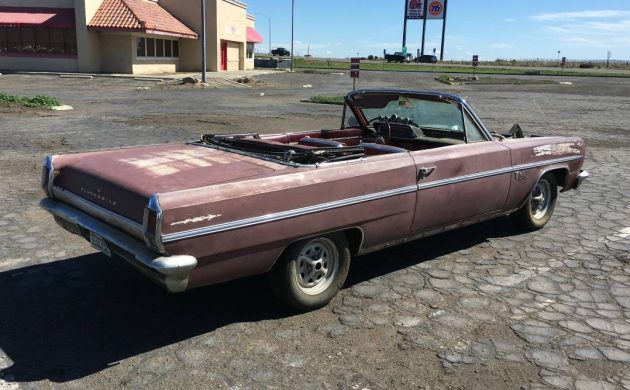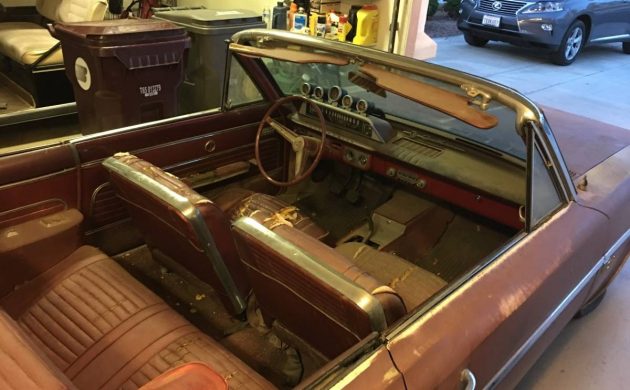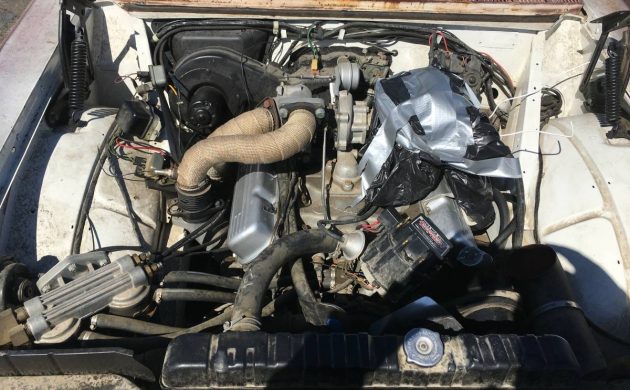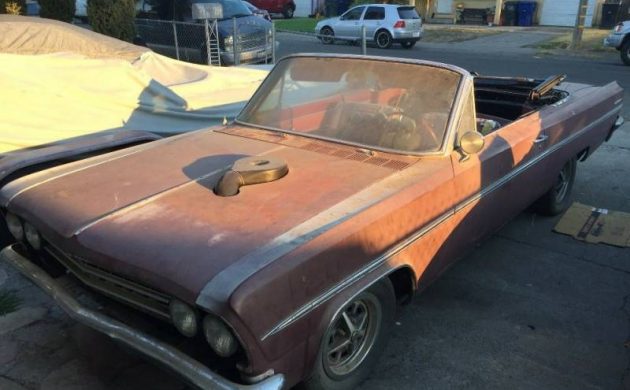The Craigslist ad for a tired old F85 convertible that Micheal found for us doesn’t look like much until you see at picture number 17. It has a turbocharger installed but it’s not complete and looks nothing like the Jetfire installation. Thanks, Michael, this is a really interesting find! If you ask your gearhead buddies who had the first turbocharger in a production car what would they guess? Was it Porsche or Saab or could it have been General Motors? In 1962 GM created a turbo version of the little Olds Cutlass and the 1962 Corvair Monza Spyder.
There have been several Jetfires written up here on Barn Finds, but only one of those had the original turbo setup. The turbocharger setup didn’t work out very well for some owners. Owners complained of low power that was caused by 2 things. The turbocharger was bypassed because owners hadn’t refilled the “TurboRocket” bottle or the turbocharger had seized because drivers didn’t drive them aggressively enough to run the turbocharger, leaving it without lubrication. General Motors offered customers a free conversion to the conventional 4 barrel carb and most owners accepted the offer. There were less than 10,000 Turbo Starfires built and very few of those still have their original turbocharger installation. There are even fewer convertibles, especially with a 4 speed. The owner says “It will start and run” but I don’t think there’s enough magic under the hood to make the engine run without plug wires.
The interior will clean up some, but the seats all need upholstery. The dash pad has been wrecked, of course, by the installation of all those gauges. Normally there would be a vacuum gauge on the console to show the boost from the turbocharger.
Here’s the little 215 CID engine with a turbocharger. Who knows what’s under the plastic, but from what we can see, that configuration is very different from stock. The exhaust side of the turbocharger appears to be missing and the compressor wheel appears to be showing. To prevent detonation, a water and alcohol mixture, called “Turbo Jet” fluid was injected. The tank is not there. Parts of this system look a little like the original but most does not. This looks like something the guys on “Road Kill” would have done. I think someone discovered they didn’t have the skills and gave up.
There was no need for a hood on the real turbocharged Jetfire. Building a turbocharged system takes some engineering and design skills. I don’t think there’s any hope to complete this project. It is a V8 convertible with a 4 speed. The best thing to do would be to return the engine to a carburated condition. This convertible would only be worth about $20,000 in good driver condition and it would take a lot of that to restore it. There is a similar, driver quality convertible for sale on Trovit for about $9,000. There is only the one picture, so there’s no way to know what condition it is in. Is there any price that this Olds would make sense? It would be great to know what’s happened with this car. What do you think about the seller claiming that it runs? I hope there’s someone out there who will take on this project and save this car.









I agree this is definitely a “Road Kill” project and would be a cool episode.
That sure looks like MGB wheels. Were that year Olds 4 1/2″ by 4 lug wheels?
Got too many projects going – but I like the looks of these. Maybe someday, I will be able to find one closer to home and without a hole cut into the hood. The MG wheels look nice on it –
A very worth project an dif everyone gave up as the writer suggested , we’d be stuck looking at the same old thing all the time. Definitely keep it going turbo
It is tempting, but I think the right decision would be NO!
MGB wheels!
It most likely won’t start & run, no plug wires ! The turbo is complete. Under the plastic is the intake stuff. If you look in the center of the engine that is the compressor. To the left is the hot section (note the wastegate location) it’s complete. Its only a 5 to7 lb. Boost. I believe the aux oil filters are the water or alcohol injection. ie all the extra hoses.
Red
Fatboys Rod n’ Custom
Quite a few errors in your write up, David. Starfires were built on the full size bodies, Jetfires were built on the compact body, and there were never any Jetfire convertibles from the factory. Aggressive driving didn’t have as much to do with turbo failure as not allowing them to spool and cool down. The oil would coke up and freeze up the turbo shaft. It was called Turbo Rocket fluid, not Turbo Jet fluid. Not sure about the ’63 console, but the ’62 four speed console was a complete die cast piece, no glove box that I recall. Hate the MG/Capri Rostyle wheels, Supra wheels look much better, IMO.
http://i17.photobucket.com/albums/b91/askkenny/18X10V1copy.gif
Guy at the 2018 Indy World of Wheels had a matched set of ’62 and ’63 Jetfires, believe he was asking $35K apiece.
Cool picture Scottymac, That was out car we showed in Indy. We sold it but still have the other 62 we had there.
It is a pretty looking car. I liked the Olds cars from that era, but forgot that they offered the turbo.
I can offer a theory of the early turbo failures from their use in heavy duty machines. According to the maintenance managers that were responsible for maintaining the machines with turbos, the most common reason for the failures, was oil starvation because the equipment operators would shut the engine down while the turbo was still spooled up. This resulted in a lack of lubrication and eventual early failure.
The previous owner of my turbo Regal, killed the turbo by never operating the engine so that the turbo was properly exercised. After the car sat for a month, the turbo was seized. This happened even though the car was well maintained in every other way.
In aviation in the 70s, the maximum life of a turbo, was about 1000 hours. It seems like a lot, but most didn’t last that long. We were considering a turbo conversion for a twin I was flying back then, and that was the reason we decided not to go ahead with it.
I like the car, but would ditch the turbo.
Bob
Most of the Olds turbos didn’t fail, the engine self destructed from detonation issues. The “Rocket Fuel” was a water/ alcohol mix to stop the detonation issue. Most times when the tank was almost empty and the indicator lit the owners would ignore it and run it as usual. We did a ton of 4 barrel conversions with new short blocks under warranty in the day.
FYI, that 63 is obviously NOT a Jetfire. The turbo setup is from a late 70s Buick V6 with the Qjet, which is why there’s a big hole in the hood. Clever adaptation, but unclear if it even runs. The four speed does not appear to be original either. Looks like a project that was never finished. You can speculate on why.
Looks like a turbo from an 81 Trans Am
I had a friend back in the early 70’s who had the F-85 2dr hardtop with the wide brushed aluminum trim like the big Olds – The car was an original 4 speed car. His Mom never had the antifreeze changed from new, and it finally clogged up and blew a head gasket. He bought the car from her, and installed a 340 Buick -which was rated @ 260 hp, but had 375 lb-ft of torque ! It looked like a factory stock car under the hood, until you realized it was a Buick engine in an Olds – the only modification he had to make was to the heater core inlet, which had to be relocated to clear the back of the cylinder head. In today’s world, it would be a cool alternative to the SBC or “drop an LS in it” mentality, and make a sneaky sleeper to boot.
I had a 1963 F85 Convertible in 1982. Loved the car loved the styling but hated the awful automatic trannies these cars came with as stock.